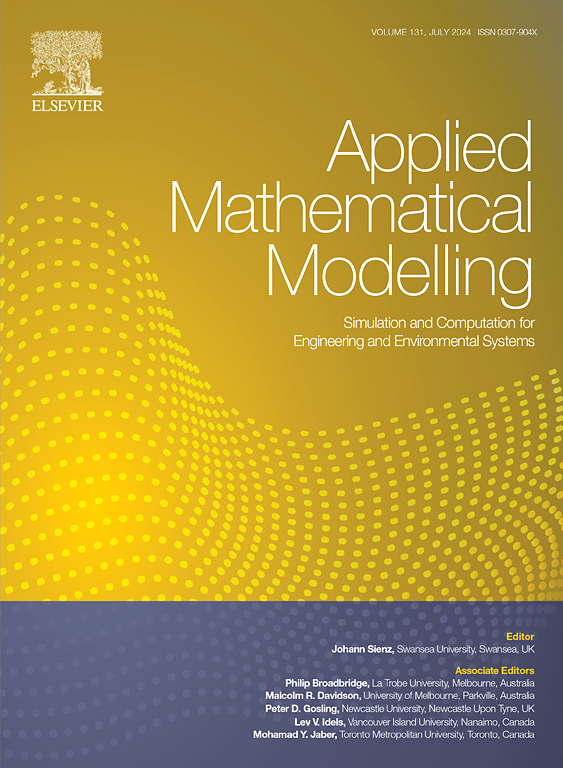Event-triggered prescribed-time distributed formation control of marine surface vessels with prescribed performance
IF 4.4
2区 工程技术
Q1 ENGINEERING, MULTIDISCIPLINARY
引用次数: 0
Abstract
In this paper, an event-triggered prescribed-time distributed formation control method is designed for marine surface vessels with prescribed-time prescribed performance subject to compound uncertainties. Firstly, we introduce variable substitutions to simplify the mathematical model of marine surface vessels. Then, a prescribed-time extended state observer is constructed to estimate unmeasured velocities and compound uncertainties at a prescribed-time. Meanwhile, a novel prescribed-time performance function with an error transformation is designed to impose constraints on formation errors. Subsequently, we design an event-triggered control mechanism taking account of error constraints, which reduces the operating frequency of actuators without weakening system transient performance. Based on the designed extended state observer, performance function and event-triggered control mechanism, a prescribed-time distributed formation control law is developed for marine surface vessels with distinguished convergence performance, good transient performance, and low actuator losses. At last, simulations are conducted to illustrate the advantages and application prospects of the designed approach. The proposed method has several notable characteristics compared with most existing strategies: 1) it guarantees the prescribed-time convergence of the formation errors; 2) it achieves prescribed-time error constraints by using the designed performance function; 3) it actualizes the quantitative balance between error constraints and the operating frequency of actuators via the proposed event-triggered control mechanism, which can avoid the excessive wear on actuators.
具有规定性能的海洋水面舰艇事件触发的规定时间分布式编队控制
针对复杂不确定性条件下具有规定时间规定性能的海洋水面舰艇,设计了一种事件触发的规定时间分布式编队控制方法。首先,我们引入变量替换来简化海洋水面舰艇的数学模型。然后,构造一个规定时间扩展状态观测器来估计规定时间的未测速度和复合不确定性。同时,设计了一种新的带误差变换的规定时间性能函数,对地层误差进行约束。随后,我们设计了一种考虑误差约束的事件触发控制机制,在不削弱系统瞬态性能的前提下降低了执行器的工作频率。基于所设计的扩展状态观测器、性能函数和事件触发控制机制,提出了一种收敛性能好、瞬态性能好、执行器损耗小的规定时间分布式编队控制律。最后通过仿真验证了所设计方法的优越性和应用前景。与大多数现有策略相比,该方法具有以下显著特点:1)保证了地层误差在规定时间内的收敛性;2)利用设计的性能函数实现规定时间误差约束;3)通过提出的事件触发控制机制实现了误差约束与执行器工作频率之间的定量平衡,避免了执行器的过度磨损。
本文章由计算机程序翻译,如有差异,请以英文原文为准。
求助全文
约1分钟内获得全文
求助全文
来源期刊

Applied Mathematical Modelling
数学-工程:综合
CiteScore
9.80
自引率
8.00%
发文量
508
审稿时长
43 days
期刊介绍:
Applied Mathematical Modelling focuses on research related to the mathematical modelling of engineering and environmental processes, manufacturing, and industrial systems. A significant emerging area of research activity involves multiphysics processes, and contributions in this area are particularly encouraged.
This influential publication covers a wide spectrum of subjects including heat transfer, fluid mechanics, CFD, and transport phenomena; solid mechanics and mechanics of metals; electromagnets and MHD; reliability modelling and system optimization; finite volume, finite element, and boundary element procedures; modelling of inventory, industrial, manufacturing and logistics systems for viable decision making; civil engineering systems and structures; mineral and energy resources; relevant software engineering issues associated with CAD and CAE; and materials and metallurgical engineering.
Applied Mathematical Modelling is primarily interested in papers developing increased insights into real-world problems through novel mathematical modelling, novel applications or a combination of these. Papers employing existing numerical techniques must demonstrate sufficient novelty in the solution of practical problems. Papers on fuzzy logic in decision-making or purely financial mathematics are normally not considered. Research on fractional differential equations, bifurcation, and numerical methods needs to include practical examples. Population dynamics must solve realistic scenarios. Papers in the area of logistics and business modelling should demonstrate meaningful managerial insight. Submissions with no real-world application will not be considered.
 求助内容:
求助内容: 应助结果提醒方式:
应助结果提醒方式:


